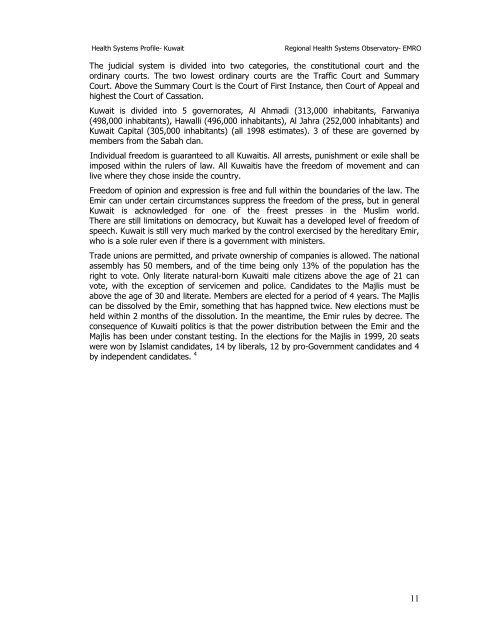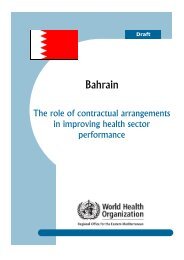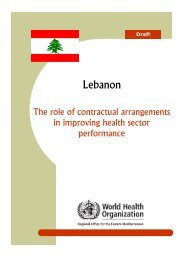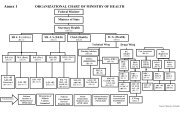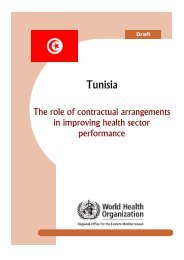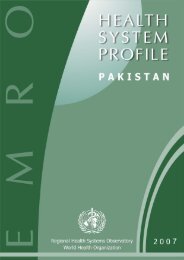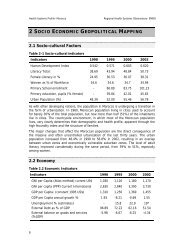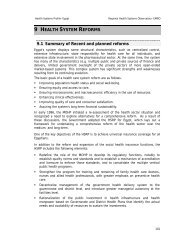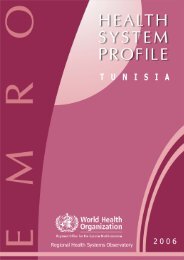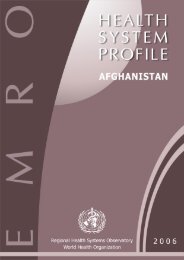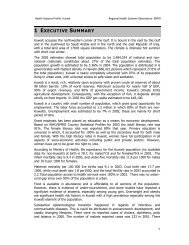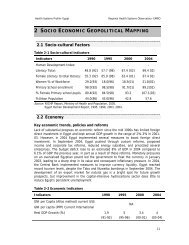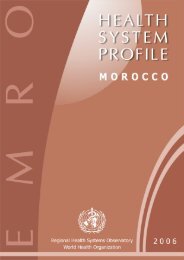Kuwait : Complete Profile - What is GIS - World Health Organization
Kuwait : Complete Profile - What is GIS - World Health Organization
Kuwait : Complete Profile - What is GIS - World Health Organization
Create successful ePaper yourself
Turn your PDF publications into a flip-book with our unique Google optimized e-Paper software.
<strong>Health</strong> Systems <strong>Profile</strong>- <strong>Kuwait</strong> Regional <strong>Health</strong> Systems Observatory- EMRO<br />
The judicial system <strong>is</strong> divided into two categories, the constitutional court and the<br />
ordinary courts. The two lowest ordinary courts are the Traffic Court and Summary<br />
Court. Above the Summary Court <strong>is</strong> the Court of First Instance, then Court of Appeal and<br />
highest the Court of Cassation.<br />
<strong>Kuwait</strong> <strong>is</strong> divided into 5 governorates, Al Ahmadi (313,000 inhabitants, Farwaniya<br />
(498,000 inhabitants), Hawalli (496,000 inhabitants), Al Jahra (252,000 inhabitants) and<br />
<strong>Kuwait</strong> Capital (305,000 inhabitants) (all 1998 estimates). 3 of these are governed by<br />
members from the Sabah clan.<br />
Individual freedom <strong>is</strong> guaranteed to all <strong>Kuwait</strong><strong>is</strong>. All arrests, pun<strong>is</strong>hment or exile shall be<br />
imposed within the rulers of law. All <strong>Kuwait</strong><strong>is</strong> have the freedom of movement and can<br />
live where they chose inside the country.<br />
Freedom of opinion and expression <strong>is</strong> free and full within the boundaries of the law. The<br />
Emir can under certain circumstances suppress the freedom of the press, but in general<br />
<strong>Kuwait</strong> <strong>is</strong> acknowledged for one of the freest presses in the Muslim world.<br />
There are still limitations on democracy, but <strong>Kuwait</strong> has a developed level of freedom of<br />
speech. <strong>Kuwait</strong> <strong>is</strong> still very much marked by the control exerc<strong>is</strong>ed by the hereditary Emir,<br />
who <strong>is</strong> a sole ruler even if there <strong>is</strong> a government with min<strong>is</strong>ters.<br />
Trade unions are permitted, and private ownership of companies <strong>is</strong> allowed. The national<br />
assembly has 50 members, and of the time being only 13% of the population has the<br />
right to vote. Only literate natural-born <strong>Kuwait</strong>i male citizens above the age of 21 can<br />
vote, with the exception of servicemen and police. Candidates to the Majl<strong>is</strong> must be<br />
above the age of 30 and literate. Members are elected for a period of 4 years. The Majl<strong>is</strong><br />
can be d<strong>is</strong>solved by the Emir, something that has happned twice. New elections must be<br />
held within 2 months of the d<strong>is</strong>solution. In the meantime, the Emir rules by decree. The<br />
consequence of <strong>Kuwait</strong>i politics <strong>is</strong> that the power d<strong>is</strong>tribution between the Emir and the<br />
Majl<strong>is</strong> has been under constant testing. In the elections for the Majl<strong>is</strong> in 1999, 20 seats<br />
were won by Islam<strong>is</strong>t candidates, 14 by liberals, 12 by pro-Government candidates and 4<br />
by independent candidates. 4<br />
11


